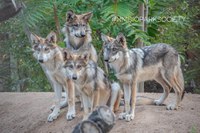Jan. 19, 2021 - The ABQ BioPark recently said a bittersweet goodbye to Mexican gray wolves Kawi, Ryder and their seven pups born in 2020. On January 15, the pack headed to Mexico, where they'll eventually be released into the wild.
Mayor Tim Keller said, "Our very own ABQ BioPark is playing a big role in international efforts to protect and help endangered species thrive, including the Mexican gray wolf. Albuquerque can be proud that its hometown zoo is focused on conservation and helping lobos make it again in the wild."
"We're excited and sad at the same time," said Erin Flynn, ABQ BioPark mammal curator. "It's a zoo's dream to directly help a wild population like this. It's even more powerful and touching for us that its our beloved lobo that we're helping. It's just amazing."
The ABQ BioPark has partnered with the U.S. Fish and Wildlife Service (USFWS) since 1983 on Mexican wolf conservation and several BioPark-born lobos have been released into the wild over the years, but this is the first international pack release for the facility. This is incredibly significant, Flynn said, as it is rare for animals that were born and raised in zoos to be released into their native habitat.
Flynn said the pack was selected for a wild release in part because they're such a successful and strong family. Ryder arrived at the ABQ BioPark in late 2018 and warmed up to his mate Kawi quickly. The two welcomed their first litter the next spring - these first three pups, including current BioPark resident Archer, were the first Mexican gray wolves born at the ABQ BioPark in 15 years. Kawi and Ryder's second litter of seven pups arrived in May 2020 and care staff said the group grew into a tight-knit pack.
ABQ BioPark staff members escorted the family to the US/Mexico border. At the border, USFWS officials gave final permission for the pack to proceed to Mexico and they were driven to a "wilding school" south of Mexico City by a team of conservationists from Universidad Autónoma de Querétaro. There, the pack will learn how to hunt and survive in the wild before they are released into their species' native range in northern Mexico. According to Flynn, this process will be hands-off and their new caregivers will make sure they're ready for a completely wild life before an official release.
For mother Kawi, this is also a homecoming of sorts, as she was born at the Zoológico de San Juan de Aragón in Mexico. She arrived at the ABQ BioPark in 2016.
This transfer and release is part of a cooperative breeding program between the Association of Zoos and Aquariums (AZA) Mexican Wolf Species Survival Plan and USFWS's Mexican Wolf Recovery Program, which aims to restore Mexican wolves to their native southwest territory in New Mexico, Arizona, Texas and northern Mexico. The Mexican gray wolf has been recognized as an endangered species since 1976. Although they once roamed throughout the American Southwest and northern Mexico, the species was all but eliminated from the wild by the 1970s.
The ABQ BioPark has welcomed 79 Mexican wolf pups since 1983. In addition to breeding, the ABQ BioPark also works closely with the USFWS Mexican Wolf Program by temporarily holding and caring for injured wild wolves that need medical treatment and/or rehabilitation. That means some wolves stay behind the scenes and are cared for by staff while they await their next destination.
Archer, who will be two years old this spring, will stay at the ABQ BioPark. He's not currently recommended for breeding, but will eventually be part of a new pack at the zoo.
Ryder and Kawi's Family Timeline
Please check each individual photo for caption and credit.

